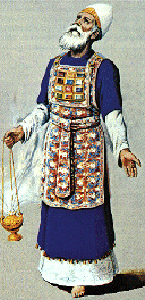 Thoughts on the Kohen Gadol and Gilad Schalit by Rabbi Reuven Spolter, Director of Recruiting and Special Projects
Thoughts on the Kohen Gadol and Gilad Schalit by Rabbi Reuven Spolter, Director of Recruiting and Special ProjectsHere in Israel, the government and public finds itself caught in the gut-wrenching debate over just how far to go to secure the release of captured soldier Cpl. Gilad Schalit. The two sides of the argument present clear but compelling contrasting arguments. On one side sit Gilad's family; his parents and brother, literally camping in a tent outside the Prime Minister's office hoping to compel the government to reach an agreement with Hamas and secure Gilad's release. On the other side sit the families of terror victims who, despite their sympathy for the Schalit family, feel that the price to be paid for Gilad's release is simply too high, and that bartering his life for the freedom of hundreds of terrorists and criminals will only further endanger the people of Israel.
They both right. It's a terrible decision to have to make, and it only makes me yearn for the days when we didn't have to make such decisions ourselves. Once upon a time Hashem Himself would answer these impossible questions for us – through the garments of the Kohen Gadol.
Among the different garments of the Kohen Gadol for his service in the Mishkah, he wore the Choshen – a breastplate. We all know what it looked like: four rows of three different types of stones. On these stones Bezalel carves the names of the tribes of Israel. But the Choshen carried an addition, critical element. Hashem instructs Moshe,
The famous Urim V'tumim raises all kinds of questions. First and foremost, what exactly was it? What does the Torah mean by telling us that through it Aharon would carry the "judgment" of the Jewish people on his heart? Finally, when we look at Parshat Pekudei and the final construction of the Choshen we learn that while Bezalel and his workers followed Moshe's instructions to a tee, they seem to have omitted one critical detail: there's no mention of the Urim V'tumim at all. (see Shemot 39:8-21) The stones were there. They weaved the garment properly. But where was the Urim V'tumim so seemingly critical to its proper function?וְנָתַתָּ אֶל-חשֶׁן הַמִּשְׁפָּט אֶת-הָאוּרִים וְאֶת-הַתֻּמִּים וְהָיוּ עַל-לֵב אַהֲרֹן בְּבֹאוֹ לִפְנֵי ה' וְנָשָׂא אַהֲרֹן אֶת-מִשְׁפַּט בְּנֵי-יִשְׂרָאֵל עַל-לִבּוֹ לִפְנֵי ה' תָּמִיד:And you shall place to the Choshen the Urim and the Tumim, and they shall be on the heart of Aharon when he enters before Hashem; and Aharon shall carry the judgment of the Children of Israel on his heart before Hashem always.
What was the Urim V'Tumim? Rashi (on Shemot 28:30) tells us:
Rashi explains that the while the Urim V'tumim served as the spiritual "battery" of the Choshen, it was not a critical aspect of its construction. Perhaps this explains why the Torah considers the Choshen complete even without the Urim V'Tumin. Ramban, agreeing with Rashi adds that,הוא כתב שם המפורש, שהיה נותנו בתוך כפלי החשן, שעל ידו הוא מאיר דבריו ומתמם את דבריו. ובמקדש שני היה החשן, שאי אפשר לכהן גדול להיות מחוסר בגדים, אבל אותו השם לא היה בתוכו, ועל שם אותו הכתב הוא קרוי משפט...This is a writing of the Holy Name which [Moshe] placed in the folds of the Choshen, through which it would light up (from Urim) his words and purify (from Tumim) his words. In the Second Temple there was a Choshen – for the Cohen Gadol could not serve with [the proper number of] garments. But that Name was not inside it, and through that name it was called "Mishpat"…
Ramban points out that Moshe himself eventually placed the Urim V'Tumim inside the Choshen when he dressed Aharon for service in the Mishkan. (see Vayikra 8:8) So, while the Urim V'Tumim were not considered part of the Choshen itself, Moshe placed this mystical scroll (or whatever "they" were) crafted by Hashem Himself into the Choshen later on. What was did Aharon use it for? Why was it so important? Rashi explains:הם סוד מסור למשה מפי הגבורה, והוא כתבם בקדושה, או היו מעשה שמיםThey were a secret given to Moshe from the mouth of Hashem, and [Moshe] wrote them in Holiness, or they were a creation of heaven.
דבר שהם נשפטים ונוכחים על ידו אם לעשות דבר או לא לעשות.A matter that they would judge and decide based on [the Urim V'Tumim] whether to do something or not.
 The Jewish people used the Urim V'Tumim to ask the impossible questions that no one person could legitimately answer himself. Should we go to war now or not? Whose sin caused the terrible suffering among the Jewish people? Is now the time to conquer new territory or remain on the sidelines? Is it better to trade terrorists for Gilad Schalit or suffer the painful price of refusing to negotiate?
The Jewish people used the Urim V'Tumim to ask the impossible questions that no one person could legitimately answer himself. Should we go to war now or not? Whose sin caused the terrible suffering among the Jewish people? Is now the time to conquer new territory or remain on the sidelines? Is it better to trade terrorists for Gilad Schalit or suffer the painful price of refusing to negotiate?Except today, we live without a direct connection. No Urim V'Tumim lights up the way. So we stumble along, groping around in the darkness, hoping that we don't make the wrong decision. All the while we must continue to pray not only for our country and her leaders, forced to make these difficult decisions, but also that Hashem bring a level of comfort and well-being to Gilad, held captive now for over one thousand days.


